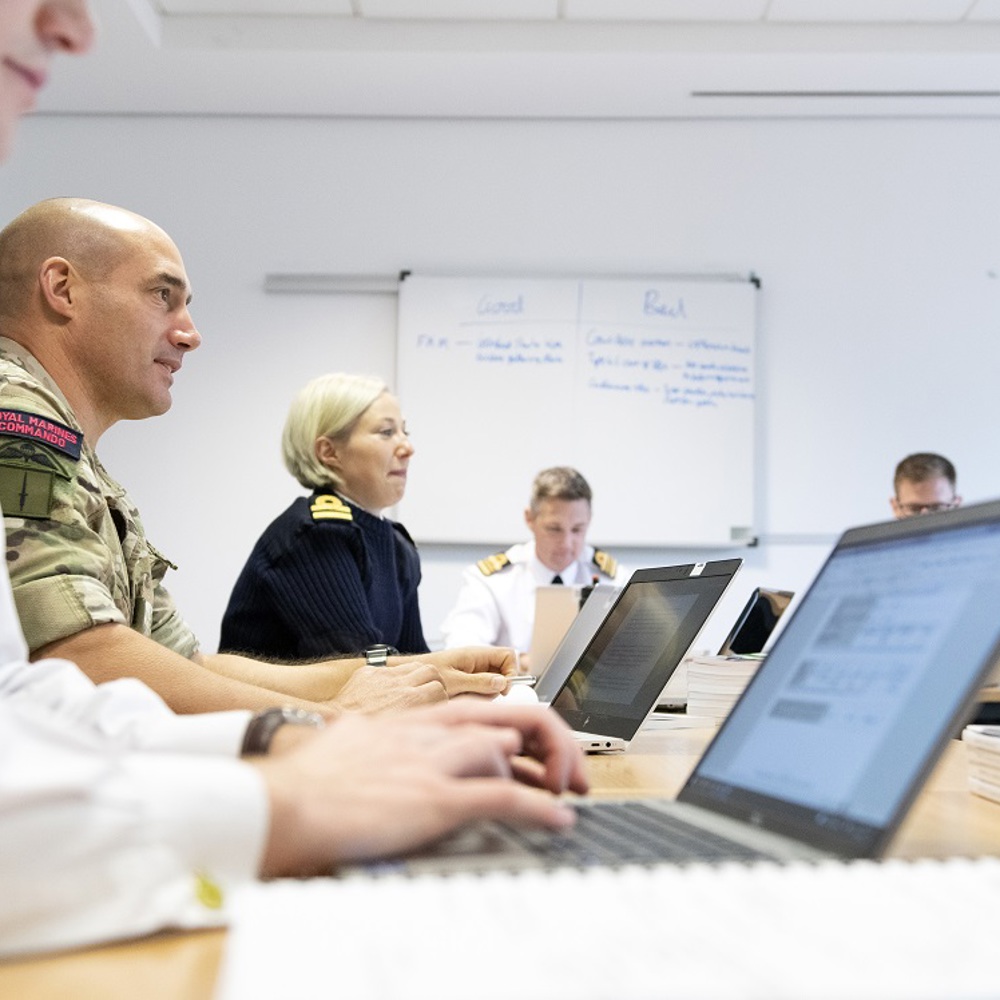Course Information
About this course
Course duration: MSc: 11 months full-time. No part-time MSc will be offered in Sep 26 \ PgDip: 11 months full-time; up to 20 months part-time and study to be completed by Jul 28 \ PgCert: up to 11 months full-time; up to 20 months part-time and study to be completed by Jul 28.
This postgraduate course is delivered by Cranfield University on behalf of the Defence College for Military Capability Integration.
The course is designed for UK military and MOD civil servants and aims to bring together the wide variety of disciplines constituting guided weapon systems technology and to present them in an integrated manner. It takes you on to an understanding of the principles of guided weapon systems technology and all interrelated and multi-disciplinary facets involved with the complete systems design process.
The course structure is modular in nature with each module conducted at a postgraduate level. The interactions between modules are emphasised throughout. A comprehensive suite of visits to industrial and services establishments consolidates the learning process, ensuring the taught subject matter is directly relevant and current.
Some visits are restricted to Five Eyes nations only.
This course is an essential prerequisite for many specific weapons postings in the UK and overseas forces. It also offers an ideal opportunity for anyone working in the guided weapons industry to get a comprehensive overall understanding of all the main elements of guided weapons systems.
This varies from module to module but comprises a mixture of oral examinations, written examinations, informal tests, assignments, syndicate presentations and an individual thesis
The course comprises a taught phase and an individual project. The taught phase is split into three main phases:
- Part one (Theory)
- Part two (Applications)
- Part three (Systems)
Cranfield University's requirement to keep their courses up-to-date and current requires constant innovation and change. The modules they offer reflect the needs of business and industry and the research interests of their staff and, as a result, may change or be withdrawn due to research developments, legislation changes or for a variety of other reasons. Changes may also be designed to improve the student learning experience or to respond to feedback from students, external examiners, accreditation bodies and industrial advisory panels.
The module is list detailed below. Modules are indicative only and may be subject to change for your year of entry.
All the modules in the following list need to be taken as part of this course:
Guided Weapons - Control and Guidance
Guided Weapons - Electro Optics and Infrared Technology
Guided Weapons - Power Electronics and Communication Systems
Guided Weapons - Systems Integration
Guided Weapons - Control Theory
Guided Weapons - Structures, Aeroelasticity and Materials
Introductory and Foundation Studies
Signal Processing, Statistics and Analysis
One of the modules in the following list need to be taken as part of this course:
Guided Weapons - Electronic Warfare
You may also elect to undertake a number of standalone modules as opposed to an MSc, PgDip or PgCert, with or without the associated assessment. A number can only be taken with assessment; for the most up-to-date information on this, refer to the module web page above. Applications for standalone modules can be made direct to Cranfield via the web page linked above.
How this course will help your career
Subject to successful completion of the course, you should have a detailed understanding of guided weapons system design and will be suited to any role or position with a requirement for specific knowledge of such systems.
Entry requirements
Who can attend this course
- Military
- MOD civil servants
- Industry
- Internationals
All applicants to courses that are wholly or partially delivered at Shrivenham must complete the BPSS (HMG Baseline Personnel Security Standard V4 April 2014) prior to registration on the course or must already hold a security clearance level or higher).
Academic Technology Approval Scheme (ATAS) Certificate. If you require a visa to study in the UK may need to apply for an ATAS certificate to study this course. Refer to the Cranfield MSc web page via 'Apply now', specifically, the tab on ‘Entry requirements’ where more detailed information is provided and a guide on applying.
Before you attend
You must have one of the following:
A first or second class honours degree or equivalent in science, engineering or mathematics. Alternatively, a lesser qualification together with appropriate work experience may be acceptable.
Additional information
How the course will be taught
- Face-to-face
How you will be assessed
This varies from module to module but comprises a mixture of oral examinations, written examinations, informal tests, assignments, syndicate presentations and an individual thesis.

